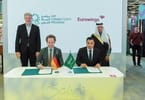TODAY newspaper in Seychelles caught up with Elsia Grandcourt at London’s World Travel Market last month for an exclusive interview in which she outlined her impressions on taking over her new post as Director for the Regional Program for Africa at the United Nations World Tourism Organization (UNWTO) based in Madrid.
Firstly, how did you take this new appointment to a senior post within UNWTO?
Ms. Grandcourt: When I accepted the position, I took it with a lot of humility, a lot of pride. I personally see it as a huge challenge for myself that can only be positive. But I have to keep that dedication and the commitment I’ve always put to any job that I do. I am equally happy and honored that a Seychelloise has managed to secure such a position within an international organization. I will make it my personal mission to ensure that not only the region but Seychelles in particular will get the additional recognition.
I knew about the opening for the job and applied as I wanted a change in my career path. My tenure at STB has been very enriching and I enjoyed the time spent there, especially having Minister (Alain) St.Ange as my mentor. I would like to thank President (James) Michel who gave me the opportunity. We achieved a lot in a short time especially with events such as the Carnival, Miss. Seychelles and hosting the Routes Africa conference.
When I look at Seychelles’ achievements in the field of tourism compared to other African countries, I see we are doing quite well. The arrival of the Vanilla Islands Organisation will provide good support to the other islands of the Indian Ocean.
It will be an advantage to have one of our own heading the Africa Desk at UNWTO. What does the work entail?
Ms. Grandcourt: The task on hand is huge and exciting as well. I think that there will be good things coming out of it. It’s a challenge for me, but for Seychelles and the region it’s good to have somebody from the region who has worked in the industry and understand our strengths and weaknesses, who knows where support is needed and can act as a facilitator.
The job comprises mostly providing technical assistance and connecting with other international organizations that can help propel initiatives like the Vanilla Islands. The task is huge especially on the African continent. I have been clearly warned of some challenging times ahead, as most of the countries in Africa are now looking at tourism as their top priority. Compared to Seychelles, the tourism industry in a lot of African countries’ is very much in its infancy and therefore requires a lot of support and assistance.
Tourism development in Africa touches many sectors such as culture, transport, air connectivity – important elements that we need to bring together. There’s a lot of work to be done in Africa. They lack the infrastructure and proper structures, policies and even clear strategies for the countries. I’ve made a few good contacts on the African continent, which is important within the industry. And I do not neglect the fact that there is a huge challenge ahead. There are 116 member countries in the UNWTO with 49 forming part of the Africa block.
How best do you think you will help fly the Africa flag at UNWTO?
Ms. Grandcourt: There’s a lot of work on the territory itself, because we need to understand first and foremost what the specific needs of member states are. I will have to conduct a lot of missions to these countries but also meet up with them at our head office. For example, we already engaged Ethiopia at the last general assembly and I have a mission there early in 2014.
At the end of the day, each country has to take ownership of its own agenda to move things forward. We need the commitment of governments in order to make things happen. Policymaking lies with the respective governments. UNWTO is a facilitator that brings the required assistance to support the initiative but it is ultimately the countries that need to make it happen.
For example in the case of Seychelles, the STB approached the UNWTO for guidance with regards to revising the structure of the Ministry of Tourism & Culture. They sent a consultant who met with the stakeholders and produced a report and recommendations that the Ministry is now implementing.
Ms. Grandcourt is already well settled in her new job at the UNWTO head office in Madrid and is looking at the priorities of the Africa Desk, outlining the 2014 work program.
This involves building the relationship with member states and focusing on those who have received less assistance from the UNWTO in the past, providing them with technical assistance in their strategic planning, tourism master plan, hotel classification and institutional structure and taking part in and organizing regional events, building capacity and producing publications that address tourism in Africa.
Her office is currently preparing for the 5th edition of the Investour forum, to be held on 23 January 2014 during FITUR, one of the world’s leading tourism fairs. The forum seeks to promote sustainable tourism development in Africa and is a key opportunity to showcase African tourism.
A roundtable discussion on tourism development in Africa will look at air connectivity, visa facilitation and investment in hotel infrastructure. Leading public and private tourism stakeholders are expected to take part and it will be followed by Business to Business (B2B) meetings between African enterprises and potential Spanish partners.
Preparation is also well underway for the 56th CAF (Commission for Africa) to be held from 28 to 30 April in Angola.
In 2012, visitors’ arrivals in Africa broke the record with 52 million tourists and US$ 33 billion in tourism receipts. In 2013, tourist flows in Africa increased by 5% in line with the world average, led by North Africa (+6%).
In North Africa, growth was led by Morocco (+7%) followed by Tunisia (+5%). Sub-Saharan African destinations (+4%) showed a mixed performance with Zimbabwe (+12%), Seychelles (+12%) and Cape Verde (+9%) in the lead, whilst South Africa reported a 3% increase.
Upon taking office Ms. Grandcourt paid courtesy visits to all the African embassies present in Madrid and hosted a lunch meeting at the UNWTO headquarters attended by the Secretary General, an event that is set to become an annual one. Her office has also launched its first quarterly newsletter this December 2013.
PHOTO: Elsia flanked by her permanent staff at the UNWTO Regional Program for Africa (L to R) – Lydia Bebe Kum Sackey from Cameroon, Helder Tomas from Mozambique – Deputy Director Regional Program for Africa, Elsia Grandcourt & Rita Bele-Zongodono from Central African Republic
WHAT TO TAKE AWAY FROM THIS ARTICLE:
- It's a challenge for me, but for Seychelles and the region it's good to have somebody from the region who has worked in the industry and understand our strengths and weaknesses, who knows where support is needed and can act as a facilitator.
- UNWTO is a facilitator that brings the required assistance to support the initiative but it is ultimately the countries that need to make it happen.
- TODAY newspaper in Seychelles caught up with Elsia Grandcourt at London's World Travel Market last month for an exclusive interview in which she outlined her impressions on taking over her new post as Director for the Regional Program for Africa at the United Nations World Tourism Organization (UNWTO) based in Madrid.






















